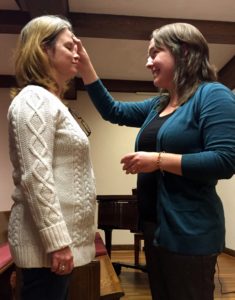 Reflection by Tracy Cady:
Reflection by Tracy Cady:
At the Ash Wednesday service we practiced Lectio Divina on Luke 9:51-62. As Mandy read the scripture for the third time, I could not help grieving a bit that this is most likely our last Ash Wednesday service in the intimacy of our chapel. The quiet as we sat close together wrapped around me and I felt the sorrow of what leaving and moving on might mean. Surely there will be palms and ashes in our future, but next time will be different. “Foxes have holes and birds have nests but the Son of Man has nowhere to rest his head.”
What struck me about the reading was the phrase, “He set his face toward Jerusalem.” That’s the English Standard Version, by the way. I went home and looked it up. The NASV simply says, “He was determined.” He set his face. What an odd, jarring way to describe how Jesus went about his business traveling to Jerusalem. As I sat pondering, I wondered what rock I have been under for the past 48 years that I have never encountered (or never paid attention to) such a peculiar phrase. I have spent my life playing with words and enjoying them, especially when they express an idea spot on. We have idioms of saving face, pulling a face, and face first. But I somehow missed the idea of setting face.
Setting his face implies a sense of purpose and not being deterred. Jesus does not get distracted by the disciples or the Samaritans, instead he rebukes his disciples and continues on his way. He calls others to follow him all the while still setting his face toward Jerusalem.
The face is an interesting feature. It is how we represent ourselves to others. We make judgments about one another based on looks or perceived expressions. The face is our outward, public appearance. It is distinguishing and a means of recognizing one another. Our news broadcasts proclaimed the first successful face transplant, an incredible means of restoring a person to health and well-being. Many of us have faces that are so reflective of our inner emotions and thoughts. They can be read as clearly as if we had said the words aloud. We often try for a poker face when really the contents of our hearts are clearly visible. We try to disguise our flaws, enhance our best features, and put forth our best faces when what we perhaps need to do is set our faces. What is God’s purpose for us and what distracts us from it?
What is it that I am so determined to do for God? Where have I set my face toward? Does my face invite the Son of Man to rest his head?

In some ways our building is the outward, public face of our church, but it is not the body— the congregation. Bricks and mortar are a blessing, but we will still be church as we move into our future without excuses, without hindrances, without the distractions to our budget that maintenance of our facilities demands. But I feel the sorrow of giving up the building for the greater purpose of ministry. “ Let me first go and bury my father…”
As ashes were smeared on my forehead, I felt humbled that indeed one day I will return to dust. But almost immediately I felt a bit foolish, kind of the same feeling of having spinach stuck in my teeth. The ash may be an outward symbol of sorrow and repentance, but there is that part of me that just wants to rub it off, to hide the smudge and pretend that my outward appearance is always exactly what I want to express and nothing more. Teach me, Oh God, to set my face for your purposes instead.